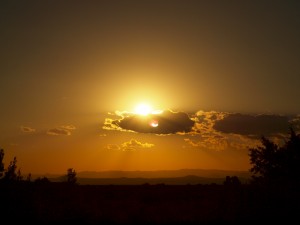 This is the sun setting during the annular solar eclipse. Obviously I don’t have the right filters for you to actually SEE that the sun is 95% occluded, but it did make for interesting light.
This is the sun setting during the annular solar eclipse. Obviously I don’t have the right filters for you to actually SEE that the sun is 95% occluded, but it did make for interesting light.
So, a lot of you know this information already. If so, you may be excused from today’s blog. Go sit in the sun and have some lemonade or something!
But, there’s apparently a lot of up and coming writers out there who don’t know this stuff, so I’m doing a little primer today. Last week, while I was being the Twitter voice for Carina Press, I saw a question come through from an aspiring writer asking if Carina, as a digital first press, ever then passes along books to another imprint for print publication. The asker was thinking of the Fifty Shades of Grey phenomenon and how the book went from ebook to print publication by a major publishing house. She was inexperienced enough not to know what question to ask and came across as sounding like she regarded ebook publication as a stepping stone to “real” publication.
I understood where she was coming from, because I get asked quite frequently if any of my ebooks will get “really published.”
Stepping stones – moving from smaller venues to bigger ones – is the path for most artists. The Beatles started out playing obscure bars in Germany and ended up on American television and playing to huge crowds. It’s a fact of life that it’s easier to get published with smaller presses to begin with than it is with major houses. Major houses have more choices, so they can be more selective. It’s also easier to self-publish than to be published by a smaller press – because there is no filter at all. Among the smaller presses, there is certainly a hierarchy. Some simply publish better stuff than others – because they have more choices and can be more selective. Now, you’re not going to find this hierarchy written down anywhere. And it changes over time. It’s largely governed by where writers want their work to be published (or where their agents want it). Sometimes this is about money, sometimes about distribution, sometimes about cache.
For a long, long time, the brass ring – the big golden prize – was publishing with “New York” or “The Big 6,” now often referred to as “legacy publishing” or “traditional publishing.” This is where the big advances were, the distribution, the cache. Publishing with New York was the literary equivalent of signing with a major record label. You might not be playing stadiums right away, but you had a shot at it.
What EL James did with Fifty Shades of Grey is write fan fiction first. A lot of authors start this way – writing stories based on someone else’s world and characters. It can be a good way to learn, just like a lot of bands start out playing covers. Self-publishing for a new writer, then, is the equivalent to standing on street corners and singing for tips. It’s a lot of work, takes a lot of courage and hustle. Things can absolutely happen that way. Billy Bragg got started that way. But you’re not going to get screaming fans packing the street right off the bat, not like if U2 decides to do a street gig. They have the audience already. The busker spends a lot of time in the rain, singing to no one.
For EL James, she hit lucky. She was a busker who got picked off the street, signed to a major label and is playing to stadiums. (I know that’s a bit of a gloss, but allow me the analogy here.) It’s great for her. It’s also not how it works for 99.9% of the writers out there. In other words: don’t try this at home.
Most writers follow a path more like The Beatles. Lots of practice, lots of tiny, obscure gigs, then better gigs, building an audience, hitting the lists in the UK, then hitting the US. It seems like an overnight success, but only if you’re not paying attention.
The thing is, publishing is all in upheaval right now. It’s unclear if New York is really the brass ring anymore. Moneywise, authors who are not playing to stadiums, stand to do much better with epublishing. The royalty rates are far, far better. No advances, but that may be an outmoded model anyway. Sure, it’s lovely to go to print, but with bookstores on the decline, does that distribution really mean what it once did? People around the world can read my ebooks who would never see a print version.Which is better?
So, it’s too late to call this a short answer, but: yes, sometimes digital first publishers also print books on paper. It depends on the press. But you sell a book to one publisher – they don’t then pass it along to a competitor. The author decides who publishes the book and signs a legal contract. Are some presses “better” than others? Yes. And the only people who can answer this question are other authors. Even then you have to take it with a grain of salt, because everyone wants to spin their own publisher as the best. Agents can also advise on this, but their criteria can be different, so you have to take that into account.
The upshot of all this upheaval is, suddenly there are so many more opportunities, so many rings of different colors and sizes to reach for. It’s up to the writer to decide what she wants.